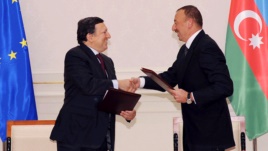http://ec.europa.eu/avservices/video/player.cfm?ref=I079685
European Commission chief Jose Manuel Barroso gave Azerbaijan chief Ilham Aliyev an easy ride on human rights in Brussels on Friday (21 June).
Speaking at a joint press briefing, Aliyev claimed there are no political prisoners in his country.
“None of my political opponents is in prison. This is absolutely the wrong information … Let me tell you, there are absolutely no political prisoners in Azerbaijan,” he said.
“Freedom of assembly is fully provided for. Freedom of media also,” he noted.
He invited EU monitors for presidential elections in October.
But he added: “We fully comply with all our obligations with respect to democratic development.”
The picture he painted is far from reality.
One political prisoner is Ilgar Mammadov.
The 43-year-old presidential candidate was arrested in February for “inciting a riot” after he went to an anti-Aliyev protest in Ismailly, a small town.
He is in pre-trial detention and he is unlikely to get out before the vote.
A family friend, who asked not to be named, told EUobserver: “There are other political prisoners, but Ilgar is symbolic: He was already nominated [for the election]. He is demanding Western values. He is the candidate for Western values.”
NGOs, such as Human Rights Watch, say around 20 people are in detention for their political views.
Khadija Ismayilova, a Baku-based journalist with the RFE/RFL news service, noted that dozens more go in and out of cells, but the “revolving door” tactic makes them hard to count.
She said Azerbaijan bears a striking resemblance to Belarus, an international pariah.
Belarus also imprisons presidential candidates.
Both regimes have recent cases of unsolved murders of government critics.
Both control TV, radio and print media, but both have struggled to contain popular dissent on the Internet and on the street.
In Ismayilova’s case, state security services last year put hidden cameras in her home then uploaded a video on the web of her having sex with her boyfriend in an attempt to demoralise her.
“I am a journalist. I hate being put in the shoes of an activist. But we have to fight for our rights, so we are put in those shoes,” she said.
Unlike Azerbaijan, Belarus, which is under a pile of EU sanctions, does not have oil or gas, however.
Aliyev on Friday noted he will “next week” decide which one of two gas pipeline projects to the EU he aims to back.
“We have more than 2 trillion cubic metres of proven reserves … This will change the energy map of Europe,” he said, referring to EU attempts to reduce dependence on Russia.
For his part, Barroso declined to challenge Aliyev’s statement on political prisoners.
He said “we in Europe are also not perfect.”
He noted that Azerbaijan is a young country which is more free today than it was in Soviet times just 20-or-so years ago.
He also said: “I am personally convinced … President Aliyev is committed to the modernisation of his country and that he cares very much about the image and reputation of his country.”
The meeting’s sole purpose was to create a feel-good factor: No EU-Azerbaijan agreements were signed. No decisions were made.
Ismayilova said she felt “insulted” when Barroso implied that post-Soviet Azerbaijan is not mature enough, politically, to be more free.
But for Mammadov’s friend, Barroso was right to err on the side of caution.
“Aliyev has a nervous temperament and Mammadov is still behind bars. If Barroso had mentioned the case in public, you never what might happen to him,” she said.
Meanwhile, EU neighbourhood commissioner Stefan Fuele summed up the state of play in EU-Azerbaijan relations in a letter to German centre-right MEP Elmar Brok on 23 May.
The memo – seen by EUobserver – said there is an “overall worsening” on human rights in the run-up to elections, but Aliyev also denies it in private.
Fuele noted that unlike Armenia or Georgia, Azerbaijan does not care about EU integration because “it is self-confident due to its energy reserves.”
But he added that it does want Western help to protect itself from Iran and Russia.
“He [Aliyev] made clear that his country’s relations with Russia have deteriorated and that he counts on the support of the EU to be able to balance the forces at play in the Caspian region,” the commissioner said.
He also said Baku wants a “Strategic Modernisation Partnership” treaty with the EU – a move that would give Aliyev prestige on the international stage.
“A draft of this document was presented to Azerbaijan [in May] and is open for consultation with member states,” he noted.
